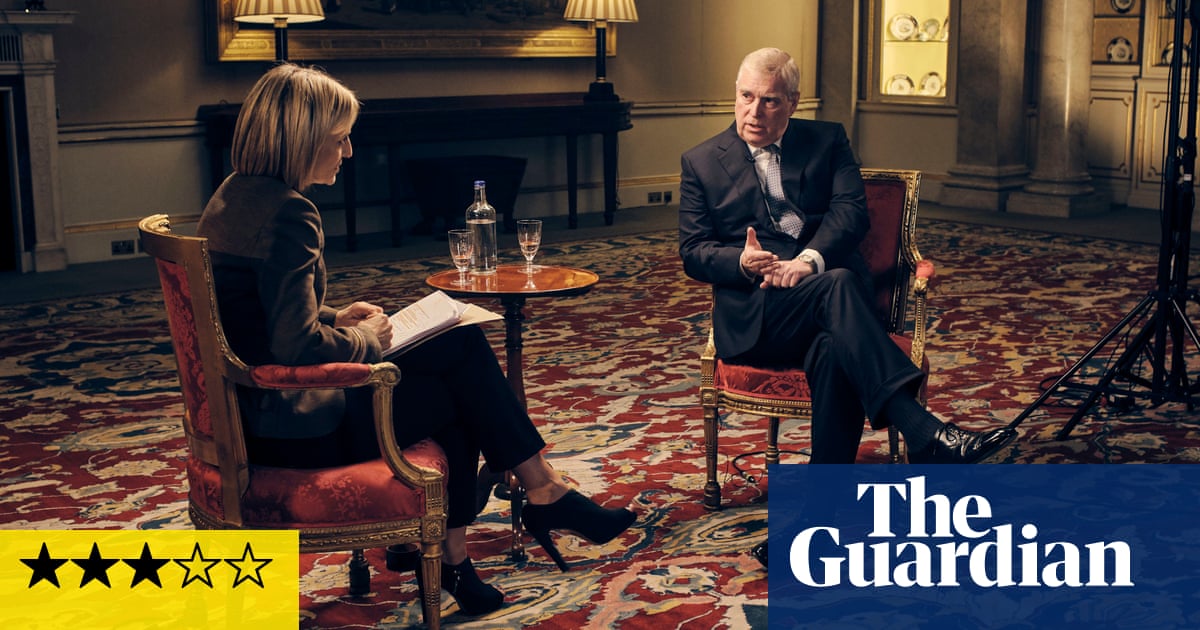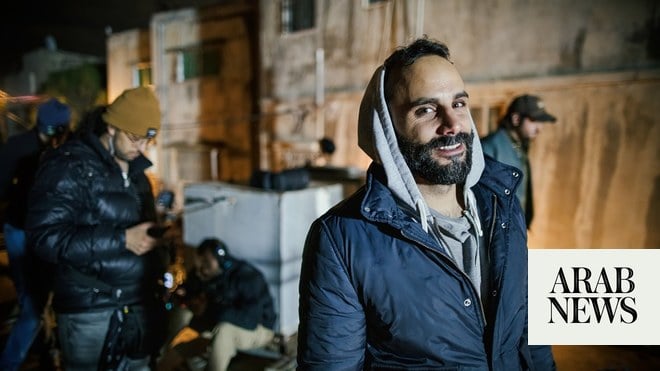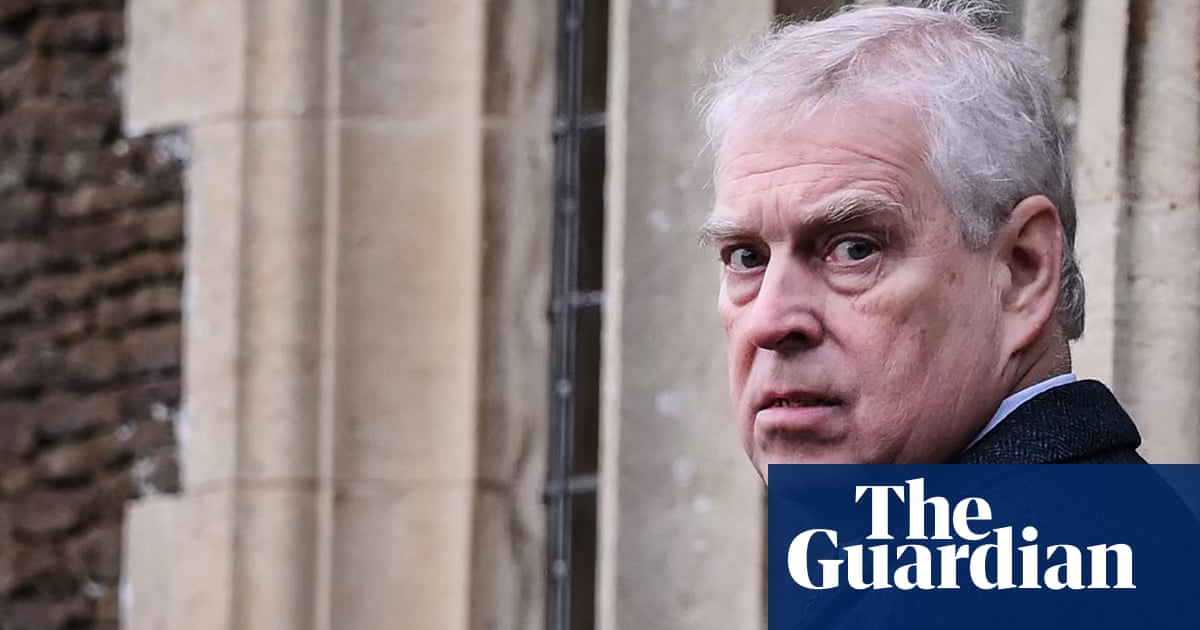
When I arrive at Brocket Hall, a stately home in Welwyn Garden City, Prince Andrew is having his photograph taken on the grand staircase, a rose clamped between his teeth as a fleet of butlers dance around him. Or rather, not Prince Andrew, but the comedian Kieran Hodgson. He is in young Andrew mode today, in his military uniform and with a full head of hair, but Hodgson later tells me that as old Andrew, he looks truly awful. “I showed some pictures of old Andrew mode to my husband and said: “Look at these!” And he said: “I find you physically repellent.”
We are on the set of Channel 4’s upcoming Prince Andrew the Musical, written by Hodgson for the channel’s Truth and Dare: 40 Years of Pushing Boundaries season. Other programmes in the season have included shows on “challenging” topics such as Too Large for Love, a documentary about men living with extra-large penises, and another about an Afghan porn star. To do a musical about Prince Andrew was Channel 4’s idea, according to producer Adam Reeve. “We were very excited that they were willing to go there,” he tells me.
It is a risky proposition. A man publicly accused of sexual assault and battery is maybe not the most obvious choice for the subject of a musical, and on that basis alone certainly counts as “pushing boundaries”. From the off, the production had a delicate line to walk between making an effective satire of Prince Andrew and not making light of the allegations. “Despite the splashiness of that concept, I think all of us involved in it from the get-go were very mindful of it not being the jokes you might exchange naughtily over a pint in the pub,” says Hodgson.
“We thought very long and hard about the sensitivity issue around the very serious allegations that were made against Andrew,” Reeve adds. “It’s part of the story, but it’s not the source of our humour.”
Today, they are filming one of the seven musical numbers that make up the show. The one on the staircase is titled England Expects, in which a young Andrew, freshly back from service in the Falklands war as a helicopter pilot, brags about what the country needs from him (“Me to accomplish very little,” Hodgson sings with a winning smile). The songs will be cut together with archive footage charting Andrew’s rise and fall, from royal pin-up in the 1970s to the disgraced spectre he is today.
Hodgson, who is perhaps most recognisable from his impressions of characters from TV shows such as The Crown that went viral during the pandemic, has done musicals on stage, but never with this much choreography. “Don’t tell anyone in production, but I’m relatively inexperienced,” he mutters to me as they reset the scene for another take. Off camera, Hodgson is a mild-mannered young man from West Yorkshire, but he is able to morph into the prince with alarming ease. When Andrew is young, Hodgson tells me, the key to an impression is a self-satisfied smirk, and in his latter years, a look of “entitled befuddlement”. And then there is the plummy voice. “I often think of the phrase ‘a perfectly ordinary shooting weekend’ to get into it,” he says.
Hodgson is part of an ensemble that also includes Harry Enfield, playing Tony Blair, and drag queen Baga Chipz, appearing as Margaret Thatcher. Also on set is Munya Chawawa, who plays Prince Charles. Chawawa is a satirist best known for his viral sketches riffing on current affairs, often turned around at incredible speed. We watch some clips on a monitor of a dance number he has later in the show, in which Charles is sporting a pair of large white eyebrows even more outlandish than Chawawa’s own. “Those were itchy as hell,” he says, looking at the screen.
There are some Jeffrey Epstein jokes in the show. Of course there are, because that is what Andrew has become most known for in recent years. The musical begins with the infamous 2019 Newsnight interview with Emily Maitlis, and an opening two-hander between Maitlis, played by Emma Sidi (as seen in Ghosts, W1A and Starstruck), and Andrew called I Nailed It. In their re-enactment, Hodgson’s Andrew begins the interview by putting a framed photograph of Epstein face down on a side table.
But, in general, those involved say that they were keen to keep the connection to Epstein and his accomplice Ghislaine Maxwell away from centre stage. “We felt that the seriousness of those people’s proven actions would really curdle any fun that anyone was having,” Hodgson says.
So where is the focus? Instead, the musical goes in hard on the flaws in Andrew’s character. “If you look at some of the great comic creations of the last 50 years, it’s Brent, Partridge, Fawlty. And I think Andrew’s right up there with having no idea just how awful a person he is,” says Stu Mather, the executive producer. The show will no doubt receive a chilly reception with the Palace. It is easy, she tells me, for Sidi to play Maitilis because the journalist is “a bit of a hero” of hers, but that’s not something everyone involved in this production can say of their characters.
The death of Queen Elizabeth II didn’t complicate things, fortunately, as a decision was made early on in the process that she wouldn’t feature as a character. She was 96 when they started production. “We just thought it would be safer; we didn’t want to make fun of an old lady,” Reeve says.
Prince Andrew’s story, while particular to him, is in some ways a timeless one: a look at what happens when untrammelled privilege and opportunity meet with a total lack of consequences. “I think it’s the story of someone born with a lack of boundaries, who indulged himself into disgrace. Someone to whom it was never in anyone’s interest to say no,” says Hodgson.
Sidi explains that she already knew loads about Prince Andrew. “I’m from Woking, so when the interview came out that was a big thing for us; I’ve been to that Pizza Express must be 400 times.” But for many younger people, the context of how Prince Andrew came to be the person who appeared in the now iconic Newsnight interview, to be so entitled and oblivious to how he was coming across, is missing. The musical is a way of introducing those audiences to the man behind the lack of sweat. Other numbers include My Profiterole, about Andrew meeting his wife, Sarah Ferguson, and forcing her to eat the dessert, and Obey, in which Prince Charles laments the “fake sheikh” scandal that saw Ferguson attempting to sell access to the royal family to an undercover journalist pretending to be a Saudi prince.
As Hodgson poses for press photos with the rose between his teeth, one of the workers on set shows me the photograph he was recreating, of Andrew returning from the Falklands covered in glory. “Us olds remember that, but I imagine you don’t,” she says. “I’ve waded through hours and hours and hours of archive footage,” Reeve tells me, “and it’s interesting to see how the media really fawned over him, particularly in a more deferential age when he was young and good-looking.”
To do it as a musical looking back at his whole lifetime thus far has allowed the makers of the show to take a longer lens view of things than is normally allowed for on topical news programmes or social media. “If you go back to something like Gulliver’s Travels, real satire doesn’t respond to what happened this week in the news,” Hodgson says. “Real satire looks at our society, its systems, its values, and lets us see those through a funhouse mirror.” And that is the hope of the makers of Prince Andrew: The Musical, ultimately. To have a bit of fun with it.












